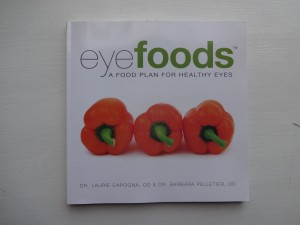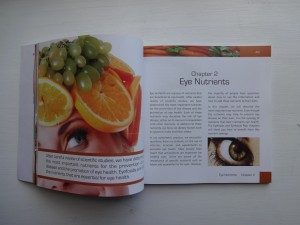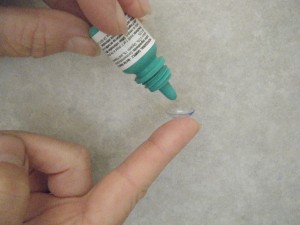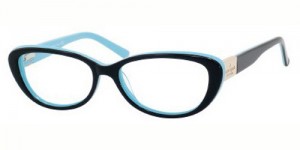 A book review is new to the eyeblog, but I’m not sure why I haven’t written one sooner. As many of you know, I am an avid reader. I have been trying to expand my reading scope beyond fiction. I’ve been picking up the occasional business book, or human interest best seller. The inaugural book I want to share is Eyefoods, a Food Plan for Healthy Eyes by Drs. Capogna and Pelletier. They are Canadian optometrists who obviously have a special interest in nutrition.
A book review is new to the eyeblog, but I’m not sure why I haven’t written one sooner. As many of you know, I am an avid reader. I have been trying to expand my reading scope beyond fiction. I’ve been picking up the occasional business book, or human interest best seller. The inaugural book I want to share is Eyefoods, a Food Plan for Healthy Eyes by Drs. Capogna and Pelletier. They are Canadian optometrists who obviously have a special interest in nutrition.
I am often asked and many times offer information about how what we eat, smoke and drink effects our eyes.  Most of my information comes from studies, lectures and my knowledge about vitamins, minerals and other ingested substances. Eyefoods is written for the layperson, it is logically laid out, with beautiful photographs. The reader can find information by eye disease : age-related macular degeneration, cataracts or dry eye, by type of nutrient: Vitamin C, Zinc, or Anti-Oxidant, and by food sources of healthy eyefood. For example, I recommend 10mg of Lutein a day for patients at risk for macular degeneration. The section about “leafy green vegetables” says that one medium leaf of raw kale is enough to achieve your daily goal of lutein and zeaxanthin. So that’s why kale is so popular lately. The authors also include recipes and simple tips to incorporate healthy choices into your routine.
Most of my information comes from studies, lectures and my knowledge about vitamins, minerals and other ingested substances. Eyefoods is written for the layperson, it is logically laid out, with beautiful photographs. The reader can find information by eye disease : age-related macular degeneration, cataracts or dry eye, by type of nutrient: Vitamin C, Zinc, or Anti-Oxidant, and by food sources of healthy eyefood. For example, I recommend 10mg of Lutein a day for patients at risk for macular degeneration. The section about “leafy green vegetables” says that one medium leaf of raw kale is enough to achieve your daily goal of lutein and zeaxanthin. So that’s why kale is so popular lately. The authors also include recipes and simple tips to incorporate healthy choices into your routine.
Healthy lifestyle and food choices not only benefit the eyes, but our over-all health. In fact the book concludes with an Eyefood Lifestyle Plan:
- Wear good quality sunglasses
- Take control of your health
- Get moving
- Quit smoking
- Take an eye vitamin
- Maintain a healthy weight
If you are looking for a food and health resource, check out this book. I know my copy has found its way to everyone’s desk in the office and each one of the Westside staff has gleaned a valuble nugget. From fiber content in cabbage to dry eye prevention, it’s all here.
Eyefood, A Food Plan for Healthy Eyes. Laurie Capogna, OD and Barbara Pelletier, OD



